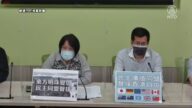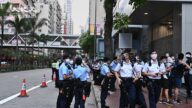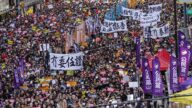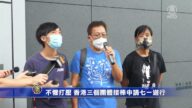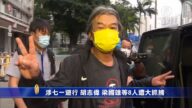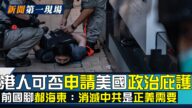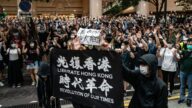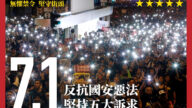【新唐人2012年6月29日訊】《華爾街日報》和香港《明報》先後報導,香港的英文大報《南華早報》不再續約外籍駐華記者慕亦仁。一直關注中國人權和中國公共事件的慕亦仁認為,「不再續約」是政治上的原因,與總編王向偉有關係。據了解,王向偉具有吉林省政協委員的背景。而「香港記者協會」對香港新聞機構受中共政府干擾及自我審查,也感到擔憂 。
《華爾街日報》「亞洲看點」於6月25號報導說,《南華早報》主編王向偉對一位屢獲人權新聞獎的外籍駐華記者慕亦仁(Paul Mooney)打出重拳,上個月告訴他因為經費原因不再與他續約。香港《明報》也在27號報導了這件事。
原《南華早報》記者慕亦仁:「我覺得是跟政治有關係,因為我在報社工作大概有兩年的合同。 不過有20多年的歷史,我一直給他們發稿子,是1990年(開始),而且我得了很多新聞獎,而且他是4月底才告訴我不跟我簽合同。」
慕亦仁從23年前開始報導與中國大陸有關的公共事件,並且關注中國大陸人權議題。今年4月,他獲得了香港記協和香港外國記者協會等頒發的「人權新聞獎」﹔去年,慕亦仁發表的一篇關於中國重金屬污染的文章也榮獲「 亞洲出版協會新聞獎」。
今年2月,《南華早報》宣佈任命報社的副總編王向偉擔任總編,他曾任職於官方媒體《中國日報》, 1996年加盟《南華早報》。王向偉目前是吉林省政協委員。
慕亦仁披露,《南華早報》老闆在大陸有投資,開了很多飯店,所以,不想得罪中共政權。並且,老闆認為王向偉是大陸那邊的,能幫他的忙,就一直扶持他。
慕亦仁表示,王向偉上臺前,他經常能在報紙上發稿。但是,自從去年前總編因觸及中共敏感議題被迫離職、王向偉上臺後,他寫了20多篇涉及大陸維權等敏感議題的新聞稿,只發表了兩篇,其中一篇還與熊貓有關係。另外,慕亦仁在美國採訪了高智晟的夫人耿和,一開始,編輯想用,後來又告訴他「王向偉說不要」。
慕亦仁:「他上臺之前,我想寫甚麼題目,大部分都可以,新疆問題、西藏問題、人權,我就跟總編輯或副編輯說一下,他們說好的。如果他們覺得有價值,他就說可以。他來了以後,有重要的新聞都不能寫。」
去年中東茉莉花革命後,中國大批維權人士被抓,慕亦仁在前總編的同意下寫了稿,但是,三個月後稿子才被刊登。
另外,從「李旺陽事件」的報導中也能看出些端倪。《南華早報》對「李旺陽事件」報導的印刷首版有400多字,零售版則縮到100字。
慕亦仁認為,很難相信這不是王向偉的決定。
慕亦仁指出,王向偉是吉林政協委員,他不僅控制像西藏、新疆、維權律師高智晟、倪玉蘭等這些敏感問題的發表,還施壓經常寫人權問題的記者。
慕亦仁:「還有其他的一些記者跟我說,他跟他們說,「啊,你以後不要寫那麼多人權,不要寫那麼悲哀的新聞」,他就跟他們說了。大家都很害怕。」
慕亦仁認為,更為嚴重的是,現在《南華早報》不只是敏感的新聞不用,還經常直接用大陸的宣傳稿,沒有任何新聞價值。
慕亦仁通過與香港記者朋友聊天,感到香港中英文報紙媒體受到限製成了一個趨勢,香港言論自由的前途很令人擔心。
「國際記聯」中國區負責人、「香港記協」主席胡麗雲指出,透過《南華早報》不再續約有豐富媒體經驗的記者事件,引發「記協」對香港新聞機構受中共政府干擾及自我審查的擔憂。她希望他們本著一個有影響力的媒體負責任的態度,給公眾一個回答。
採訪/秦雪 編輯/宋風 後製/肖顏
Hong Kong Media Ex-Reporter Unveils Self-Censorship
Wall Street Journal and Hong Kong’s Ming Pao reported
of a failure of Hong Kong’s South China Morning Post to renew contract with its foreign journalist Paul Mooney.
Mooney has long dedicated himself to reporting on China’s
human rights and public events, thus he views the issue as a political decision.
The Post’s chief editor Wang Xiangwei, a member of
Jilin’ Political Consultative Conference Committee (PCCC), is believed to be behind the issue.
Hong Kong Journalists Association expressed concerns
of the public over the mainland communist regime’s control.
The regime interferes with and requests self-censorship
from Hong Kong’s media outlets.
The Post’s chief editor Wang Xiangwei failed to renew
a contract with Paul Mooney
since this May due to budget problems,
the Wall Street Journal reported on June 25.
Paul Mooney is known for writing many
award-winning reports on China’s human rights.
The news were also covered
by Hong Kong’s Ming Pao on the 27th of June.
Paul Mooney (ex-journalist, the Post): “I think this was
a political decision. I have been on contract for two years.
I wrote articles for the newspaper since 1990, some
20 years now, and I’ve won many awards for my reporting.
He didn’t inform me until the end of this April,
that he would not be able to renew my contract.”
Mooney began to report on mainland China’s public events
and human rights issues 23 years ago.
In April, he won Hong Kong’ Human Rights Press Award,
and a Society of Publishers in Asia award for his article on heavy-metal pollution, published in 2011.
This February, the Post promoted Wang Xiangwei
to a chief editor from his deputy chief editor position.
Wang joined the Post in 1996, and previously worked for
China Daily, Chinese Communist Party'(CCP) official media.
Currently, he is a member of Jilin’s PCCC.
Mooney disclosed that the Post’s head owns many hotels
in mainland China and is reluctant to offend CCP’s regime.
Thus the head nurtures mainlander Wang,
believing Wang has some influence in the mainland.
Mooney’articles were published in the newspaper regularly,
until Wang took office, the journalist says.
The former chief editor was forced out for sensitive topic
reporting, and now under Wang’s censorship Mooney got only two stories published, one of which on panda bears.
The rest – some 20 China stories – were all
on sensitive issues, including rights-defenses.
In the US, Mooney had interviewed Geng He,
the wife of China’s renowned lawyer Gao Zhisheng.
Mooney reveals that an editor expressed interest
in the story, but later told him that Wang had spiked it.
Mooney: “Before he took office I could write any newsworthy
stories, like issues on Xinjiang, Tibet and human rights,
as long as I got the nod from the chief editor or his deputy.
After he came in, all important news
were not allowed to be covered.”
In 2011, the Middle East 『Jasmine revolution』 affected China,
and great many rights activists were arrested by the regime.
Even with approved proposal by the deputy chief editor,
Mooney’s finished article would languish for three months before being published.
The Post’s coverage on the death of Li Wangyang
is another example.
An original 430-words article in its first edition was shaved
down to a brief 100 words piece for the next edition.
Mooney notes, it is hard to believe that the decision
was made by anyone but Wang.
Wang, a member of Jinlin’s PCCC, not only rejects pieces,
covering sensitive topics, but also pressures the journalists who report on China’s human rights.
Mooney: “Some staff reporters said to me, 『Don』t report
on so many miserable human rights stories any more.’
That means he told them so,
and everyone is afraid."
What is worse, the Post frequently uses CCP’s official
press releases, which have no news value, Mooney shares.
After talking with his Hong Kong peers, Mooney realized
there is a tendency in Hong Kong-based newspapers,
both Chinese and English to go under restriction.
Hong Kong’s future, in terms of freedom of speech,
is worrisome, he remarks.
Woo Lai-wan, president of Hong Kong Journalists
Association and China region Chief of International Federation of Journalists, spoke on the issue too.
Woo pointed out that Mooney’s contract not being renewed
has aroused concerns within the Association.
They think the CCP has interfered with and exerted
self-censorship on the Hong Kong’s media outlets.
Woo appealed to the South China Morning Post
to openly respond to these concerns of the community.



